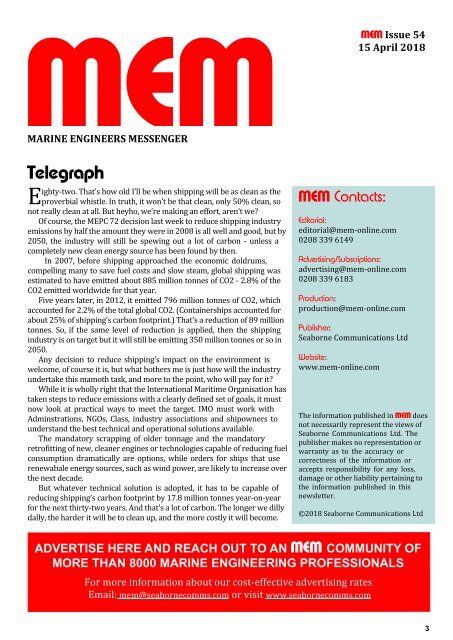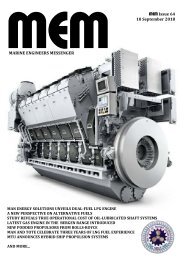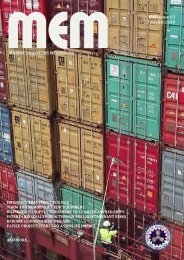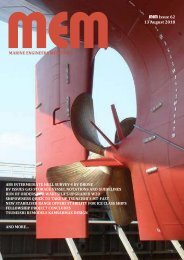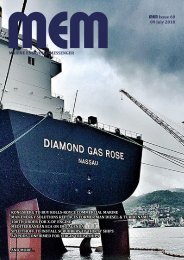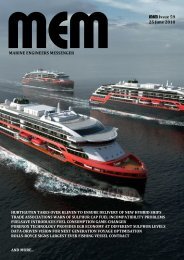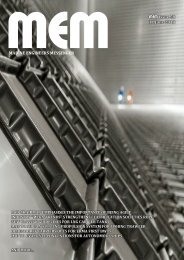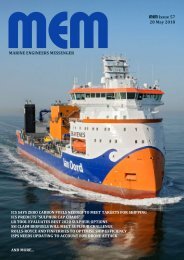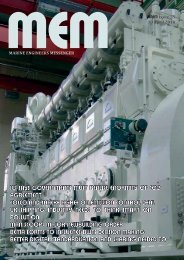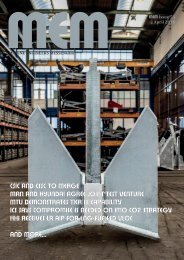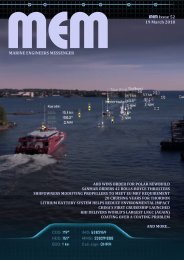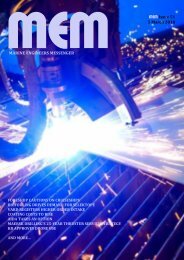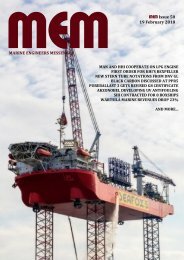Create successful ePaper yourself
Turn your PDF publications into a flip-book with our unique Google optimized e-Paper software.
MEM<br />
MARINE ENGINEERS MESSENGER<br />
Telegraph<br />
Eighty-two. That’s how old I’ll be when shipping will be as clean as the<br />
proverbial whistle. In truth, it won’t be that clean, only 50% clean, so<br />
not really clean at all. But heyho, we’re making an effort, aren’t we?<br />
Of course, the MEPC 72 decision last week to reduce shipping industry<br />
emissions by half the amount they were in 2008 is all well and good, but by<br />
2050, the industry will still be spewing out a lot of carbon - unless a<br />
completely new clean energy source has been found by then.<br />
In 2007, before shipping approached the economic doldrums,<br />
compelling many to save fuel costs and slow steam, global shipping was<br />
estimated to have emitted about 885 million tonnes of CO2 - 2.8% of the<br />
CO2 emitted worldwide for that year.<br />
Five years later, in 2012, it emitted 796 million tonnes of CO2, which<br />
accounted for 2.2% of the total global CO2. (Containerships accounted for<br />
about 25% of shipping’s carbon footprint.) That’s a reduction of 89 million<br />
tonnes. So, if the same level of reduction is applied, then the shipping<br />
industry is on target but it will still be emitting 350 million tonnes or so in<br />
2050.<br />
Any decision to reduce shipping’s impact on the environment is<br />
welcome, of course it is, but what bothers me is just how will the industry<br />
undertake this mamoth task, and more to the point, who will pay for it?<br />
While it is wholly right that the International Maritime Organisation has<br />
taken steps to reduce emissions with a clearly defined set of goals, it must<br />
now look at practical ways to meet the target. IMO must work with<br />
Adminstrations, NGOs, Class, industry associations and shipowners to<br />
understand the best technical and operational solutions available.<br />
The mandatory scrapping of older tonnage and the mandatory<br />
retrofitting of new, cleaner engines or technologies capable of reducing fuel<br />
consumption dramatically are options, while orders for ships that use<br />
renewabale energy sources, such as wind power, are likely to increase over<br />
the next decade.<br />
But whatever technical solution is adopted, it has to be capable of<br />
reducing shipping’s carbon footprint by 17.8 million tonnes year-on-year<br />
for the next thirty-two years. And that’s a lot of carbon. The longer we dilly<br />
dally, the harder it will be to clean up, and the more costly it will become.<br />
MEM Contacts:<br />
MEM Issue 54<br />
15 April 2018<br />
Editorial:<br />
editorial@mem-online.com<br />
0208 339 6149<br />
Advertising/Subscriptions:<br />
advertising@mem-online.com<br />
0208 339 6183<br />
Production:<br />
production@mem-online.com<br />
Publisher:<br />
Seaborne Communications Ltd<br />
Website:<br />
www.mem-online.com<br />
The information published in MEM does<br />
not necessarily represent the views of<br />
Seaborne Communications Ltd. The<br />
publisher makes no representation or<br />
warranty as to the accuracy or<br />
correctness of the information or<br />
accepts responsibility for any loss,<br />
damage or other liability pertaining to<br />
the information published in this<br />
newsletter.<br />
©2018 Seaborne Communications Ltd<br />
ADVERTISE HERE AND REACH OUT TO AN MEM COMMUNITY OF<br />
MORE THAN 8000 MARINE ENGINEERING PROFESSIONALS<br />
For more information about our cost-effective advertising rates<br />
Email: mem@seabornecomms.com or visit www.seabornecomms.com<br />
3


